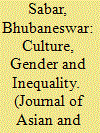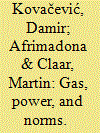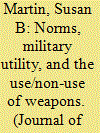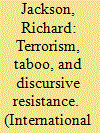|
|
|
Sort Order |
|
|
|
Items / Page
|
|
|
|
|
|
|
| Srl | Item |
| 1 |
ID:
188947


|
|
|
|
|
| Summary/Abstract |
This ethnographic paper explores gender inequality in tribal societies vis-à-vis customary practices and challenges the notion of egalitarianism of tribal society by taking Chuktia Bhunjia tribe of Odisha, India as an analytical category. In the light of a discussion on women specific taboos and restrictions, captured through formal interview, narrative and lived experience approach, the paper explicates the deeply embedded nature of the taboos in Chuktia Bhunjia society and unravels how prohibiting women from socio-economic and religious space, backed by purity-pollution philosophy, perpetuate the gender inequality among them. It was found that although economic division of labour is indistinct; women are perceived being portrayal of misfortunes during perceived pollution periods and are prohibited to enter into sacred places – kitchen room, cowshed, sacred groves and forest – and take part in community festivals and other auspicious occasions. The existing material culture, especially kitchen room, alongside economic structure, self-notion of ‘outsiders’ and apparently fixed customary laws have direct influence on the position of women in this society. It is found that the customary laws are not mere symbolic expressions in perpetuating the gender asymmetry, but have become a powerful tool to patriarchal controls not only over women’s education, health, properties and knowledge, but also over individual’s choice, freedom, decision-making and sexuality. However, internal challenges are reported against customary laws and taboos, the fear of social ostracism, the obligation to restore the purity of cultural entity and anxiety reinforce people to be always submissive to those practices. Therefore, unless there is transformation alongside their culture, it is fruitless to think of gender equality.
|
|
|
|
|
|
|
|
|
|
|
|
|
|
|
|
| 2 |
ID:
169458


|
|
|
|
|
| Summary/Abstract |
What restrains states from employing chemical weapons during modern war? Despite widespread and consistent efforts by the international community to outlaw chemical weapons in the twentieth century, major deviations from this goal occur. Two of the strongest explanations that exist for this trend are the logics of deterrence and norms that consider the use of chemical weapons to be a taboo. We test these theories using factor analysis and find that norms provide a better explanation of non-use in the twentieth century among states with a chemical-weapon capability. We then conclude with avenues for future research in this burgeoning field of study, which includes closer qualitative examination of norms, as well as the expansion of the dataset to include intrastate warfare and non-state warfare.
|
|
|
|
|
|
|
|
|
|
|
|
|
|
|
|
| 3 |
ID:
146232


|
|
|
|
|
| Summary/Abstract |
The role of norms and military utility in the use of weapons is disputed by constructivist and realist scholars. Through an examination of US decision-making regarding anti-plant and irritant agents in the Vietnam War, I advance this debate in three key ways. First, I develop structural realism’s expectations regarding the role of military utility. Second, I demonstrate that social and material factors are at play in our understandings of both ‘norms’ and ‘military utility’, and that both played a role in US decisions. Third, I find that the dominant role – as structural realism expects – was played by military utility.
|
|
|
|
|
|
|
|
|
|
|
|
|
|
|
|
| 4 |
ID:
141290


|
|
|
|
|
| Summary/Abstract |
More than a decade of the war on terror has increased levels of direct and structural violence and strengthened the forces of political oppression across the globe. Within this historical material context, as well as the intellectual context of the “narrative turn” and the wider “cultural turn” currently underway in International Relations, this article explores the ways in which the terrorism novel might act as a mode of discursive resistance or literary resistance to these (oppressive) forms of power, as a site of emancipatory agonistic politics, and as a social scientific method of analysis. Among possible forms of discursive resistance, the novel—as a narrative mode—has genuine potential due to its affective as opposed to confrontational form, its engagement with the emotional aspects of international politics, its lack of conventional boundaries, and its potential reach. However, to date, the terrorism novel has not realized its potential as a mode of resistance, but has instead tended to reinforce the counterterrorism truth regime by reinforcing and maintaining the modern terrorism taboo. In this respect, the publication of Confessions of a Terrorist: A Novel (Jackson 2014) represents something of a watershed, as it is one of the first sympathetic fictional depictions of a terrorist and the first to give primary voice to the perspective of the terrorist. Allowing the terrorist to speak not only acts to resist and undermine the terrorism taboo and generate empathetic projection, but potentially also creates an agonistic moment in which the violent subaltern can speak on an equal footing directly to the counterterrorist—and by extension, to the reader. The article concludes by reflecting on the potential of the novel as a site of both resistance and agonistic encounter and the challenges of employing literary resistance to domination.
|
|
|
|
|
|
|
|
|
|
|
|
|
|
|
|
|
|
|
|
|